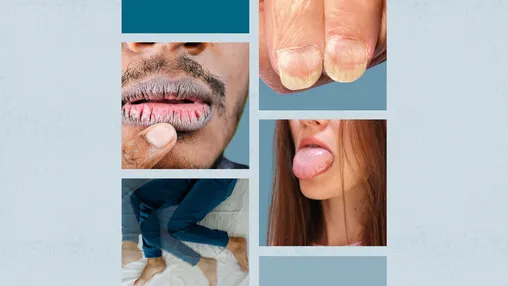Iron is one of the most essential minerals in the body, especially for women. From supporting healthy blood production to ensuring that oxygen is efficiently transported throughout the body, iron plays a critical role in overall health and well-being. Yet, iron deficiency is one of the most common nutritional deficiencies in women worldwide. Recognising the early signs of iron deficiency in women is vital for preventing more serious health problems like iron-deficiency anaemia.

In this post, we will walk you through the common signs and symptoms, answer key health questions (such as whether anaemia can cause vertigo, swelling, or even diarrhoea), and highlight why maintaining healthy iron levels is crucial for women.
Read Also: How to Stop Sugar Cravings Naturally at Night: 7 Proven Strategies
Why Women Are More Prone to Iron Deficiency
Women are at a higher risk of iron deficiency than men due to several factors:
- Menstruation – Monthly blood loss can significantly deplete iron stores, especially if periods are heavy.
- Pregnancy – The body needs more iron to support both the mother and the developing baby.
- Dietary gaps – Women who avoid red meat or follow vegetarian/vegan diets may not get enough absorbable iron.
- Postpartum demands – After childbirth, iron needs remain high to replenish lost stores.
This makes it even more important for women to know the early signs of low iron levels.
How Do You Know If You Have Low Iron as a Woman?

The early signs can sometimes be subtle and easily mistaken for stress or fatigue. However, these symptoms should not be ignored:
- Persistent Fatigue and Weakness – Feeling constantly drained, even after rest, is a hallmark symptom.
- Pale or Sallow Skin – A noticeable paleness, especially in the face, lips, and inside of the eyelids, can indicate reduced haemoglobin.
- Shortness of Breath – You may feel winded during simple activities like climbing stairs.
- Unusual Cravings (Pica) – Craving ice, dirt, or chalk can be linked to iron deficiency.
- Hair Loss and Brittle Nails – Iron deficiency can weaken hair and nails.
- Headaches and Dizziness – Reduced oxygen delivery to the brain can trigger frequent headaches.
- Cold Hands and Feet – Poor circulation is another red flag.
👉 If you are experiencing several of these symptoms, it’s important to speak with a healthcare provider for a simple blood test to check your iron levels.
Can Anaemia Cause Vertigo?

Yes. Iron-deficiency anemia can cause dizziness and vertigo. This happens because when hemoglobin levels drop, less oxygen reaches the brain. The brain responds to this lack of oxygen by making you feel lightheaded, dizzy, or in some cases, like the room is spinning. Women with low iron often report:
- Frequent dizzy spells
- Difficulty concentrating
- Feeling faint after standing up quickly
This is one of the most overlooked but significant early signs.
Can Anaemia Cause Swelling?
Yes, but indirectly. Iron-deficiency anaemia can sometimes lead to swelling in the hands, ankles, or feet. This swelling is known as oedema and can happen when low oxygen levels strain the heart, causing fluid buildup. Additionally, iron deficiency may cause swelling or soreness of the tongue (glossitis) and cracks at the corners of the mouth.
While swelling is not the most common symptom, it can still occur in women with more advanced iron deficiency.
Can Low Iron Cause Diarrhoea?
This is less straightforward. Iron deficiency itself does not directly cause diarrhea. However, there are two important links:
- Underlying conditions – Some medical conditions that cause diarrhoea (such as celiac disease, Crohn’s disease, or heavy intestinal infections) can also impair iron absorption, leading to deficiency.
- Iron supplements – When women start taking iron pills to treat a deficiency, some may experience digestive side effects, including constipation, nausea, or diarrhoea.
So while iron deficiency isn’t typically the cause of diarrhoea, the relationship is often indirect. If diarrhoea persists alongside other deficiency symptoms, it’s worth seeking medical advice.
Read Also: Feeling Burnt Out? Take This Work-Related Stress Test
Why Iron Is So Important for Women
Iron does much more than just prevent fatigue. Here’s why maintaining healthy levels is critical for women:
- Supports Reproductive Health – Adequate iron reduces the risk of complications during pregnancy and postpartum.
- Boosts Energy and Performance – Women with normal iron levels tend to have better focus, higher stamina, and improved mood.
- Protects the Brain – Oxygen-rich blood nourishes the brain, reducing the risk of memory and concentration issues.
- Strengthens Immunity – Iron is necessary for the immune system to fight off infections effectively.
When to See a Doctor

If you suspect iron deficiency, don’t just rely on self-diagnosis. See your healthcare provider if you:
- Feel persistently tired despite resting
- Notice unusual dizziness or vertigo
- Experience swelling in your extremities
- Develop unexplained headaches or paleness
A simple ferritin test or hemoglobin test can confirm whether your iron stores are low.
Recognising the early signs of iron deficiency in women can make all the difference in preventing long-term complications. From fatigue and dizziness to swelling and digestive issues, these symptoms should not be ignored. While anaemia can indeed cause vertigo and sometimes swelling, low iron rarely causes diarrhoea on its own.
For women, keeping iron levels balanced is not just about avoiding tiredness—it’s about supporting reproductive health, brain function, and overall vitality. If you notice several of these signs, the best step forward is to consult your doctor and get tested.




One thought on “Early Signs of Iron Deficiency in Women: Symptoms, Causes, and What You Need to Know”
Comments are closed.